Docx files for personal book: Verbum 9 part 1; Verbum 9 part 2; Verbum 9 part 3; Verbum 9 part 4; Verbum 9 part 5; Verbum 9 part 6; How to use the Verbum Lectionary and Missal; Verbum 8 tips 1-30; Verbum 8 tips 31-49
Reading lists: Catholic Bible Interpretation
Please be generous with your additional details, corrections, suggestions, and other feedback. This is being built in a .docx file for a PBB which will be shared periodically.
Previous post: Aside: Source criticism Next post: Tip 9a
Aside: Roles of people
We started nearly 210 posts ago, with the simple search for a person, dealing with complications such as:
- A person’s name in multiple morphological forms
- Multiple people sharing a name
- A name (proper noun) also being a common noun
- A person known by multiple names
- A person known by a multi-part name
- A name that is distinguished by diacritical marks
- A name with spellings that vary by language
Now it is time to summarize, how to search for (or find preselected) roles that the person might fill.
From Factbook: Biblical Person: See also
The first source of roles is from the Factbook entry for an individual – the place Faithlife encourages Verbum users to use as their starting point for Bible studies. The two entries of interest are both under “See Also” – Relatives and Roles.
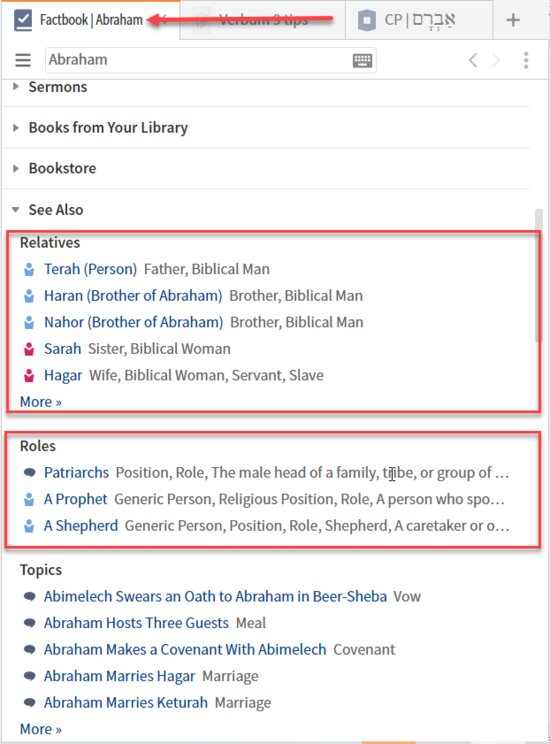
Family roles
The “Relatives” section provides the roles of the individual (Abraham) within his family e.g., father, son, uncle, husband …
Here is the nearly complete list for Abraham:
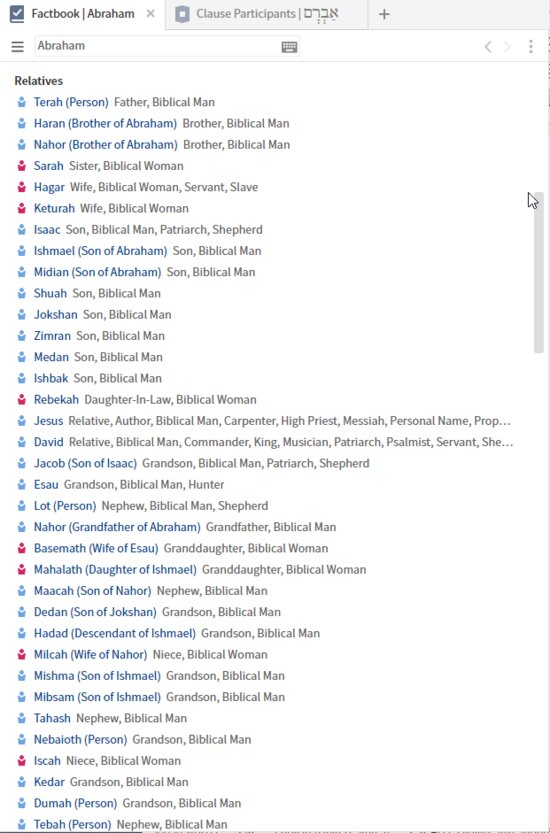
If one wishes to focus on a particular relationship, e.g., brothers, the List of Brothers in the Bible Factbook entry provides the information. The left menu panel shows the available family relationships. Yes, one must scroll through the data on the right to find Abraham; no, I know no links into these lists other than one’s own memory.
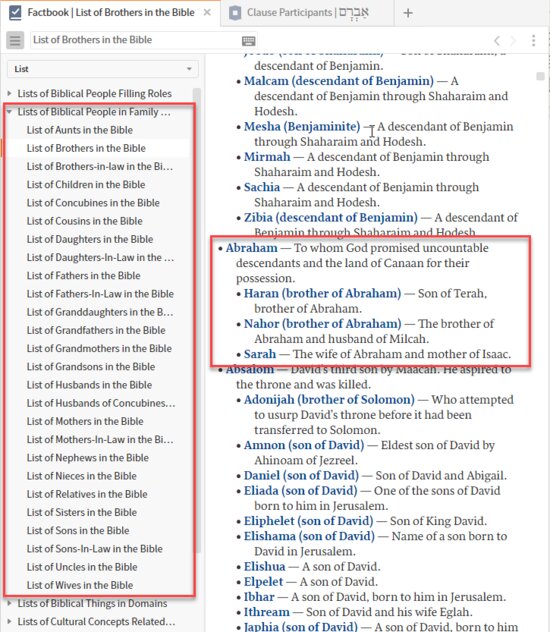
Yes, I know Sarah is female … I have a question in the forums on her inclusion … if the entry is to be read “Abraham is a brother to …” the inclusion is appropriate. If the entry is to be read “Abraham has as a brother …” the entry is incorrect.
Factbook social/economic role
The Roles section of the See also section is complete without expansion.

The information is also present in the heading for the Factbook entry:
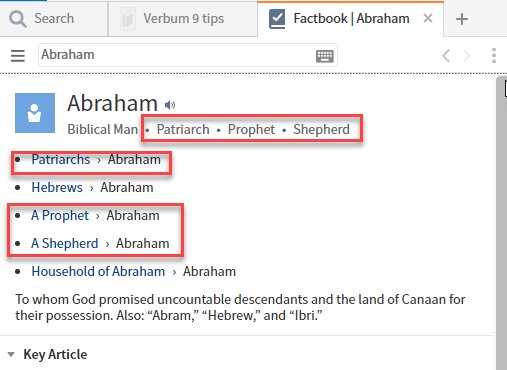
Again there is a list for the social/economic role, still without obvious links or search capabilities.
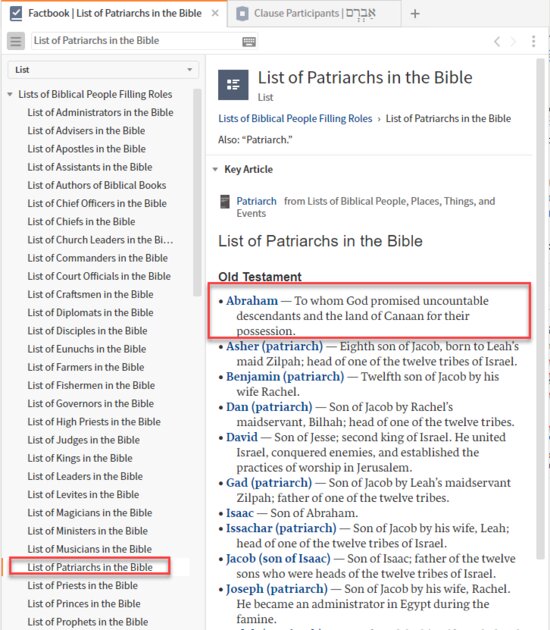
From Bible Word Study: Clause participant
In the Bible Word Study Guide (Word Guide) the Clause Participant Guide (section) provide role data in the word under investigation. Here our interest is on the Clause Participant data on the lemma of Abraham’s name.
From Verbum Help:[quote]
Clause Participants Section
The Clause Participants guide section summarizes search data for clauses (including referents) and groups them by the Biblical Knowledgebase entity. When all required resources are owned, this section has two views: Grammatical Roles (subject, object, etc.) and Semantic Roles (agent, patient, etc.).
This section appears in the Bible Word Study.
Learn More
• Semantic Roles and Case Frames documentation — dataset documentation[1]
Note that the grammatical roles are often not given in the level of granularity that is most useful but the data is still useful.
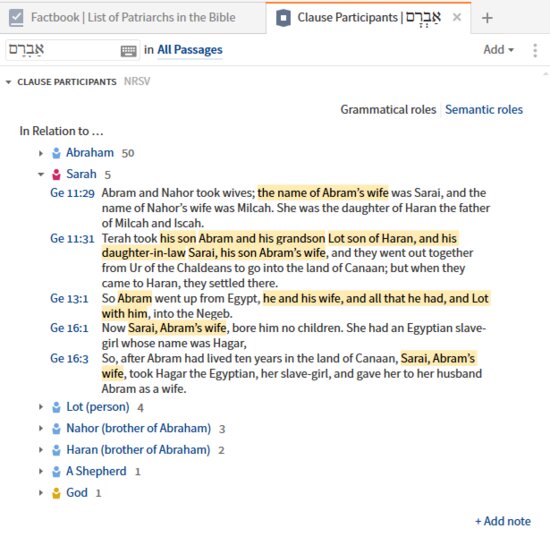
The semantic role data is more detailed.
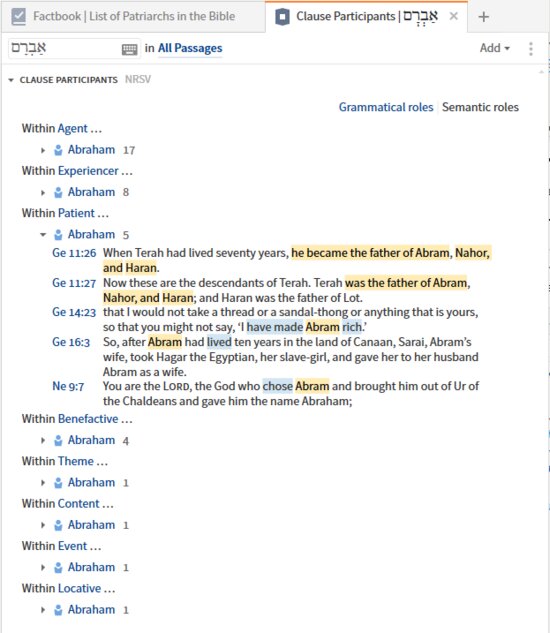
Grammatical role
The grammatic role data can be verified/clarified by a clause search specifying a grammatical role. Available roles are:
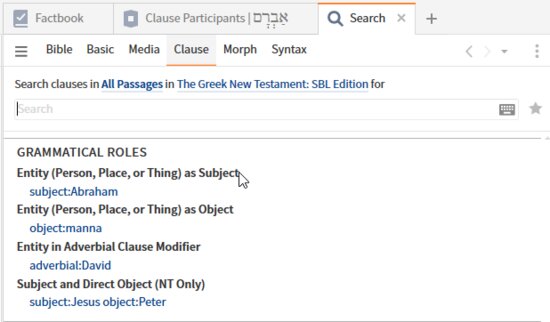
Entering the search argument for Abraham as object – note the Bible Person entity icon on the right.
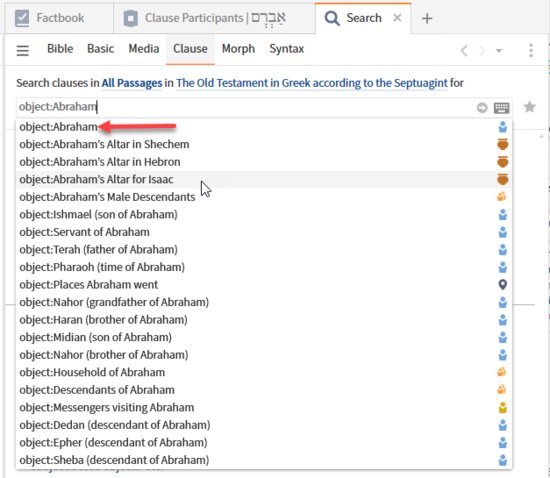
Run the search against the Lexham Hebrew Bible:
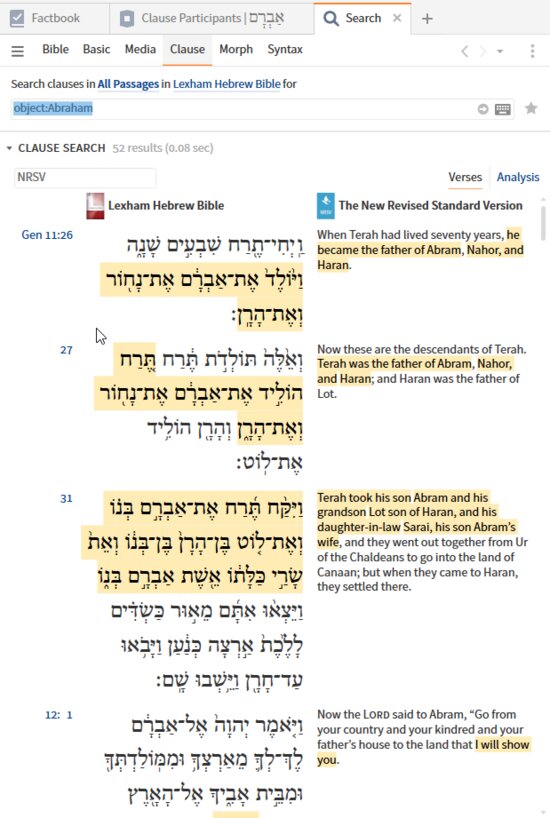
Semantic role
The semantic role data can be verified/clarified by a clause search specifying a semantical role. An incomplete list of the available roles:
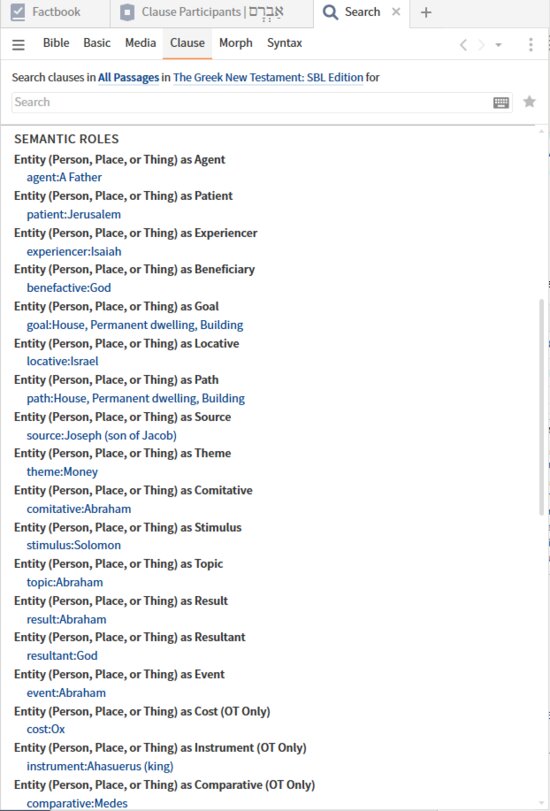
Entering the search argument for Abraham as experiencer:
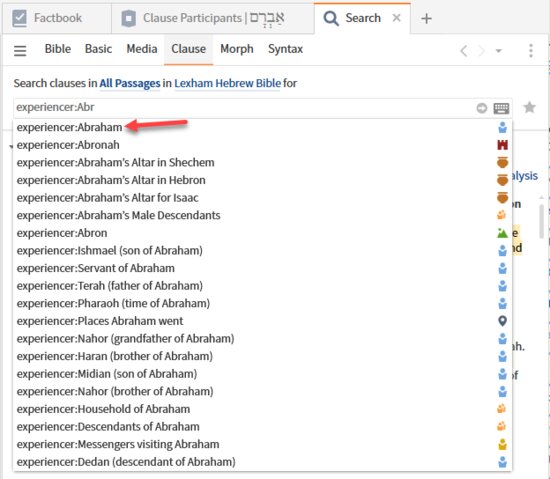
Run the search:
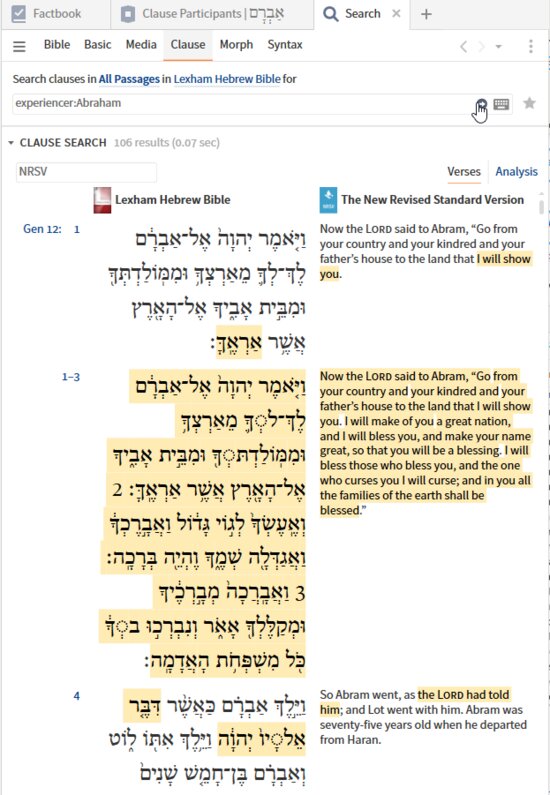
Remember that the clause search, like the morphology search, has a strong analysis view for following the details.
Search options:
Label functional role
Reconsider the label searches by concentrating on the attributes which require a <Person> value. These are roles of an individual such as a builder of an altar or the host of a meal or the victim of a killing.
|
Tab
|
Reference: Search
|
|
Altar
|
{Label Altar
WHERE Builder ~ <Person Noah (builder of ark)> }
|
|
Benediction
|
{Label Benediction
WHERE Addressee ~ <Person God>
AND Speaker ~ <Person Noah (builder of ark)>}
|
|
Covenant
|
{Label Covenant
WHERE Giver ~ <Person God>
AND Receiver ~ <Person Noah (builder of ark)> }
|
|
Famine
|
{Label Famine WHERE Affected ~ <Person Family of Jacob>}
|
|
Fast
|
{Label Fast
WHERE Faster ~ <Person Jesus> }
|
|
Judge
|
{Label Judge
WHERE Agent ~ <Person Othniel> }
|
|
Killing
|
{Label Killing
WHERE Perpetrators ~ <Person Cain>
AND Victims ~ <Person Abel (son of Adam)>}
|
|
Marriage
|
{Label Marriage
WHERE Husband ~ <Person Adam (first man)>
AND Wife ~ <Person Eve>}
|
|
Meal
|
{Label Meal
WHERE Guest ~ <Person Abraham>
AND Host ~ <Person Melchizedek>}
|
|
Miracle
|
{Label Miracle
WHERE Agent ~ <Person God>
AND Patient ~ <Person Abednego>}
|
|
Oath
|
{Label Oath
WHERE Addressee ~ <Person Abraham>
AND Speaker ~ <Person God>}
|
|
Offering
|
{Label Sacrifice
WHERE Offerant ~ <Person Noah (builder of ark)>}
|
|
Parable
|
{Label Parable
WHERE Audience ~ <Person Crowd hearing Parables>
AND Speaker ~ <Person Jesus>}
|
|
Prayer
|
{Label Prayer
WHERE Addressee ~ <Person God>
AND Speaker ~ <Person Noah (builder of ark)>}
|
|
Priest
|
{Label Priest
WHERE Agent ~ <Person A Priest> }
|
|
Prophet
|
{Label Prophet
WHERE Agent ~ <Person Isaiah>
AND Deity ~ <Person God>}
|
|
Regent
|
{Label Regent
WHERE Agent ~ <Person Nebuchadnezzar>}
|
|
Song
|
{Label Song WHERE Singer ~ <Person A Woman> }
|
|
Supernatural being
|
{Label Supernatural Being
WHERE Name ~ <Person God> }
|
|
Theophany
|
{Label Theophany
WHERE Agent ~ <Person God>
AND Beholder ~ <Person David>}
|
|
Vow
|
{Label Vow
WHERE Addressee ~ <Person God>
AND Speaker ~ <Person Psalmist (Davidic)>}
|
A search example of Abraham as a guest at a meal.
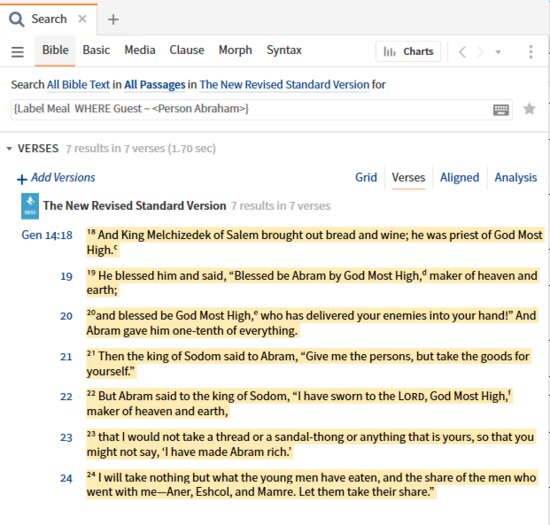
[1] Verbum Help (Bellingham, WA: Faithlife, 2018).